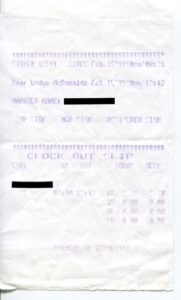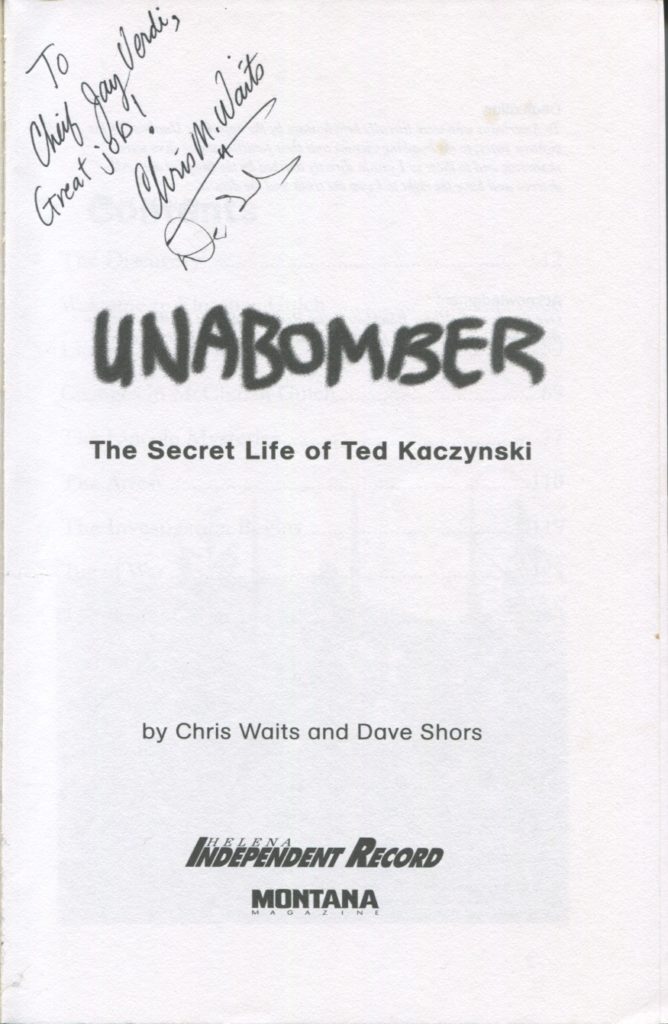I am still working on my book about manifesto writers. I believe it will come out this year, and I encourage you to pray for my editor and publisher because I have brought my defining trait – unrestrained verbosity – to my discussions of Valerie Solanas, Arthur Bremer, Anders Behring Breivik and others. Keeping me focused and on point is no simple task, so don’t be surprised if I ramp up with more, “Here’s something interesting I’m obsessing about but has no place in my book” entries about the people behind these manifestos, as we pare down the book by the pound rather than by the word.
As I was pulling out notes for the chapter on Ted Kaczynski, aka the Unabomber, a small piece of paper fell out. I’d already read and made notes in the book, and I use proper bookmarks these days, so it was kind of weird that what appeared to be a cashier receipt was in my book. It must have been between the last page and back cover because I can’t imagine how else I would have missed it. Maybe I’d spaced while tidying up one day and put a receipt in the book? Dumber things have happened.
A closer look at the receipt showed me that it was indeed part of the book when I purchased it.
Click to see the full size.
Turns out this was not a receipt for goods purchased. It’s a time clock receipt for an employee at a McDonald’s located in Deer Lodge, Montana. I blocked out the names of the manager and the employee because Deer Lodge, which is a little over an hour’s drive from Lincoln, is a small town. Even though this time card slip is dated February 15, 1999, there’s a chance these people would still be easily identifiable. My readers as a group are really cool people but, still, best not to drag anyone into my site or the topic of Ted Kaczynski unless I know they’re sort of okay with it (or are beyond the harms of online harassment.
I mentioned Lincoln above because the mountains and gullies in Lincoln are where Ted Kaczynski retreated in 1972 and was arrested in 1996. That is important information because the book from which this receipt fell, UNABOMBER: The Secret Life of Ted Kaczynski was written by Chris Waits, a longtime Lincoln resident and the person who knew Ted the best while he was occupying that cabin that the FBI literally hauled off for evidence. Chris owned the land that permitted Ted access to gullies where he tested his bomb-making and engaged in the sort of monkey-wrenching that would have given Edward Abbey a hard-on, so Ted had to maintain what seemed, at the time, like a friendly relationship with Waits.
So seeing that the receipt was from Deer Lodge in 1999, when the book was published, was interesting. I began to dig through the book for more clues and I realized that this book was inscribed. Both authors signed this book (Chris’ coauthor was Dave Shors). In my defense, I bought this book used (because it is no longer in print) and it came to me in a flurry of books I’d ordered to help me with this project. No lie, one day 21 books arrived in the mail. But still, overlooking a dual author inscription is unusual for me.
Okay, this is the sort of inscription that causes an obsessive who should be writing her book to spend precious time investigating who “Chief Jay Verdi” was and why he did a good job and why that receipt ended up in his book. I have no idea about the receipt, by the way. Neither names on the receipt come up in regards to Jay Verdi in online searches, but I didn’t spend much time digging, to be honest. Did Chief Verdi stop for coffee in Deer Lodge one day and find some hapless morning shift worker’s time slip and use it as a bookmark in the book inscribed to him? Did he lend this book to a niece or cousin working at McDonald’s and they read it on their break?
Jay Verdi died in 2008, and a cursory look at people associated with him on social media shows how much he is missed. He lived a long time in Lincoln, later moving to Helena, and was an extremely civic-minded man. He worked for FEMA, and he joined the volunteer fire fighters in Lincoln in 1972. He was elected “chief” of the volunteer fire fighters from 1997-1999, hence his title. There’s still a lot of information about him online, and while I can’t find any direct lines between him and the search for the Unabomber, the fact is that the Lincoln emergency services had their work cut out for them given the number of times Kaczynski sabotaged logging machinery, as well as all the time he spent refining his bombing techniques. I don’t feel comfortable reproducing actual photos of him but there are pics of him out there, dressed as Santa and posing with dogs for Christmas, showing off an antique fire engine, and basically just being a dude who lived and worked in Lincoln.
The best story about him I found did, however, involve the Unabomber:
Unabomber file 2: Heard about the Unabomber T-shirts the Lincoln volunteer fire department and ambulance crew is selling (“Home of the Unabomber. The last best place to hide–Lincoln, Montana”)? Jay Verdi, one of the volunteers, wants to thank Illinois and Indiana fire departments for their shirt orders. “We’re over halfway there to raising the $7,200 for a new defibrillator,” he told our source.
I think Chief Jay and I would have had a lot to talk about – I love his decidedly earthy sense of humor and his willingness to do the hard work needed to have a safe community, especially in underfunded emergency services. I don’t know how his copy of the book ended up with the McDonald’s time card tucked away along the back cover, but I suspect his book went the way of all possessions when we die. I get the feeling this book has changed hands a couple of times before it ended up with me because the dealer I bought it from is in Kentucky. I feel lucky I have it now because Jay Verdi seemed like a righteous dude, one who had to deal with the less showy elements of cleaning up after Ted Kaczynski. It’s a weird little piece of terrorist history, and though I seldom get rid of books, I definitely will be holding on to this one. It has good vibes and a good story behind it, and even a little bit of mystery via that McDonald’s time slip. Godspeed, Chief Jay. I’m glad I’ve got your book.
